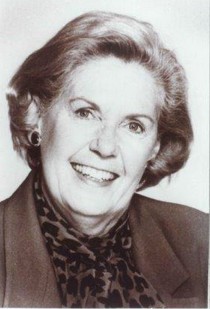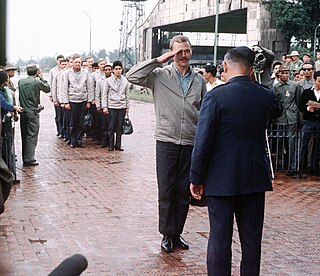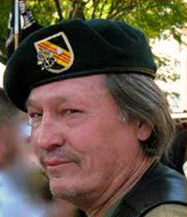
Hỏa Lò Prison was a prison in Hanoi originally used by the French colonists in Indochina for political prisoners, and later by North Vietnam for U.S. prisoners of war during the Vietnam War. During this later period, it was known to American POWs as the "Hanoi Hilton". Following Operation Homecoming, the prison was used to incarcerate Vietnamese dissidents and other political prisoners, including the poet Nguyễn Chí Thiện. The prison was demolished during the 1990s, although its gatehouse remains a museum.

James Bond "Jim" Stockdale was a United States Navy vice admiral and aviator who was awarded the Medal of Honor in the Vietnam War, during which he was a prisoner of war for over seven years.

Missing in action (MIA) is a casualty classification assigned to combatants, military chaplains, combat medics, and prisoners of war who are reported missing during wartime or ceasefire. They may have been killed, wounded, captured, executed, or deserted. If deceased, neither their remains nor grave have been positively identified. Becoming MIA has been an occupational risk for as long as there has been warfare.
The Defense Prisoner of War/Missing Personnel Office (DPMO), as part of the United States Department of Defense, was an organization that reported to the Under Secretary of Defense for Policy through the Assistant Secretary of Defense. DPMO provided centralized management of prisoner of war/missing personnel (POW/MP) affairs within the Department of Defense.

Sybil Elizabeth Stockdale was an American campaigner for families of Americans missing in South East Asia.

George Thomas Coker is a retired United States Navy commander who was awarded the Navy Cross for extraordinary heroism as a prisoner of war (POW) during the Vietnam War. An Eagle Scout, he is noted for his devotion to Scouting.

The Joint POW/MIA Accounting Command was a joint task force within the United States Department of Defense (DoD) whose mission was to account for Americans who are listed as Prisoners of War (POW), or Missing in Action (MIA), from all past wars and conflicts. It was especially visible in conjunction with the Vietnam War POW/MIA issue. The mission of the Joint POW/MIA Accounting Command was to achieve the fullest possible accounting of all Americans missing as a result of the nation's past conflicts. The motto of JPAC was "Until they are home".

Operation Homecoming was the return of 591 American prisoners of war (POWs) held by North Vietnam following the Paris Peace Accords that ended U.S. involvement in the Vietnam War.

The National League of Families POW/MIA flag, often referred to as the POW/MIA flag, was adopted in 1972 and consists of the official emblem of the National League of Families of American Prisoners and Missing in Southeast Asia in white on a black background. In 2019 the National POW/MIA Flag Act was signed into law, requiring the POW/MIA flag to be flown on certain federal properties, including the U.S. Capitol Building, on all days the U.S. flag is flown.
The Senate Select Committee on POW/MIA Affairs was a special committee convened by the United States Senate during the George H. W. Bush administration to investigate the Vietnam War POW/MIA issue, that is, the fate of United States service personnel listed as missing in action during the Vietnam War. The committee was in existence from August 2, 1991 to January 2, 1993.
The National Alliance of Families for the Return of America's Missing Servicemen is an American organization founded in 1990. Its goal is to resolve the fates of any unreturned U.S. prisoners of war or missing in action from World War II on forward, and to gain the return of any live prisoners.
The Vietnam War POW/MIA issue concerns the fate of United States servicemen who were reported as missing in action (MIA) during the Vietnam War and associated theaters of operation in Southeast Asia.
Evelyn Fowler Grubb was the wife of an American Vietnam War Air Force pilot who became a prisoner of war, she was also a co-founder and then later served as the national coordinator of the National League of Families, a nonprofit organization that worked on behalf of Vietnam-era Missing in Action (MIA) and Prisoner of War (POW) Families. Grubb also oversaw the creation of the famous "You Are Not Forgotten" POW/MIA flag that still flies in front of all U.S. Post Offices, many firehouses and police stations, all major U.S. Military installations as well as most veterans organization chapters in the United States.

In Love and War (1987) is a Vietnam War-based thriller/drama television film starring James Woods and Jane Alexander. It was directed by Paul Aaron. The film is based on the true story of James Stockdale and Sybil Stockdale. James Stockdale, a highest-ranking naval officer, was held as a prisoner of war in Vietnam, whilst Sybil Stockdale became a co-founder, and then later served as the national coordinator of the National League of Families, a nonprofit organization that worked on behalf of American Vietnam-era Missing in Action and Prisoner of War Families. The film's screenplay was written by Carol Schreder, who was also one of the film's producers. The screenplay was based on the book In Love and War: The Story of a Family's Ordeal and Sacrifice During the Vietnam Years, which was written by James and Sybil Stockdale themselves.
Members of the United States armed forces were held as prisoners of war (POWs) in significant numbers during the Vietnam War from 1964 to 1973. Unlike U.S. service members captured in World War II and the Korean War, who were mostly enlisted troops, the overwhelming majority of Vietnam-era POWs were officers, most of them Navy, Air Force, and Marine Corps airmen; a relatively small number of Army enlisted personnel were also captured, as well as one enlisted Navy seaman, Petty Officer Doug Hegdahl, who fell overboard from a naval vessel. Most U.S. prisoners were captured and held in North Vietnam by the People's Army of Vietnam (PAVN); a much smaller number were captured in the south and held by the Việt Cộng (VC). A handful of U.S. civilians were also held captive during the war.

Theodore Lane Sampley was an American Vietnam War veteran and activist. He primarily advocated for those servicemen still considered missing in action or prisoners of war (POW-MIA) as of the end of hostilities in 1975. A staunch political conservative, he also ran for local political office several times. He is credited with the research that identified Air Force Lt. Michael Blassie as the Vietnam fatality buried at the Tomb of the Unknown Soldier, and for his role in organizing the annual Rolling Thunder motorcycle event in Washington. In Kinston, North Carolina, where he lived for much of his adult life, he was known for his local civic activism, most notably his effort to build a replica of the Confederate ironclad CSS Neuse, the only full-size replica of a Confederate ironclad, in the city's downtown.

Phillip Neal "Phil" Butler is a retired United States Navy officer and pilot. He was the eighth-longest-held U.S. prisoner of war (POW) held in North Vietnam during the Vietnam War. Butler, who was forced to eject after a mid-air explosion on April 20, 1965, was a prisoner of war in North Vietnam until his release as part of Operation Homecoming in 1973. Butler was one of the five POWs credited with establishing the tap code. The code enabled the prisoners to communicate with each other.

The League of Wives of American Vietnam Prisoners of War was an organization founded in 1967 initially intended for sharing information and support among the wives of POW and MIA soldiers during the Vietnam War. The league was founded by Sybil Stockdale, the wife of detained American soldier James (Jim) Stockdale. Although its initial aim of the league was to provide support for its members, the league's wives were inspired to take action to ensure the safe return of POW and MIA Americans in Vietnam after being left discontented by the US military when it could not effectively provide families with the statuses or conditions of their relatives. The letters sent and meetings held by the league with military officials throughout the latter half of the Vietnam War attracted some animosity and significant media attention.
The Joint Personnel Recovery Center was a joint task force within Military Assistance Command, Vietnam (MACV) active from 1966 to 1973, whose mission was to account for United States, South Vietnamese and Free World Military Assistance Forces (FWMAF) personnel listed as Prisoners of War (POW) or Missing in Action (MIA) in the Vietnam War.
The Joint Casualty Resolution Center was a joint task force within the United States Department of Defense, whose mission was to account for United States personnel listed as Missing in Action (MIA) in the Vietnam War.












